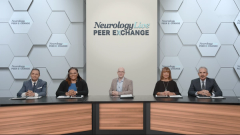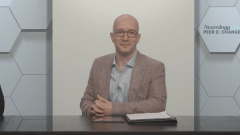
Differences Between MS Patient Characteristics in Clinical Trials and Real-World Populations
Stephen Krieger, MD; Daniel Bandari, MD, MS; Bruce Hughes, MD; Mitzi Williams, MD; and Heidi Crayton, MD, review the OPTIMISE study and reflect on the differences between patient characteristics in clinical trial settings vs clinical practice.
Episodes in this series

Stephen Krieger, MD: We’re here at the Congress of ECTRIMS [European Committee for Treatment and Research in Multiple Sclerosis] in Amsterdam, the Netherlands, in the fall of 2022. It’s nice to be at an in-person event. There’s a lot of new work being presented here. One piece of work by Dr Ruth Dobson and colleagues from a project called the OPTIMISE study, this was conducted out of the United Kingdom, and it looked at just how different patients are in real-world populations than in the studies, and finding one of the main differences is they’re older. Patients in real life are older than in clinical trials because, of course, there’s an age cap in clinical trials, and we don’t have an age cap in real life as we take care of people with MS [multiple sclerosis] well into their geriatric time point. Dr Williams, how does age as a comorbidity affect how you’re thinking about MS treatment or starting MS treatment in general?
Mitzi Williams, MD: That’s an excellent question. And I agree that there are a lot of data that we don’t have. So we, in a way, wind up experimenting in the real world with our patients. One of the biggest concerns for me is immunosenescence. We’re concerned about infection in our patients, particularly those who may be on very high-efficacy therapy. I do a lot of counseling. I have to take a good look at comorbidities, the general health of that patient, and look at what would be the best option for them, particularly for those who are starting therapy if we want to start on something that may be less efficacious, or for those who are previously on therapy and may begin to have issues with that therapy. I think it’s a conversation that we have constantly, and we have to constantly reassess, particularly once they get over a certain age.
Stephen Krieger, MD: As a complement to this project from the United Kingdom characterizing patients in the real world as being older and having more complexity than people in trials, there was recently the DISCO-MS study, which looked at stopping MS treatments after the age of 55, in thinking perhaps, they won’t be as necessary. The results of that study are a little complicated. I don’t know if either of you, Dr Crayton, wants to comment on, did the DISCO-MS study results influence how you think about treating or not treating in the older age group?
Heidi Crayton, MD: I had an issue with cessation of DMT [disease-modifying therapy] at the age of 55. I think that’s still pretty young. I don’t think we’re into immunosenescence, frankly, at that stage. People still do continue to have inflammatory events at that stage of their MS journey. So that tarnished the results for me in terms of usefulness. As Mitzi was discussing immunosenescence, I think it is something we all have started to discuss with our patients. For me, it’s a little older, it’s 65ish that I start to have that conversation of the intersection of immunosenescence, meaning increased infection risks as well. I think of all of that put together. But it’s very individual; I have some patients who are 60, who I think of as 75. I have some patients who are older, who I think of as much more youthful. I tend to treat patients individually.
Stephen Krieger, MD: As Dr Bandari said earlier, one does have to personalize these things, and even a trial like DISCO-MS, although it’s a real-world trial, still is a contrived one-size-fits-all strategy, which may not apply to everyone. Dr Hughes, do you have a take on that study result?
Bruce Hughes, MD: I was much more hopeful that the data were going to be more helpful. And it didn’t answer a lot of questions for me. I completely agree with my 2 colleagues about the concept of immune senescence. But I think with regard to discontinuation, the discussion should be de-escalation when you have, like what Mitzi mentioned about infection risk, but also cancer risk as we get older.
Stephen Krieger, MD: I think these are all really good points. In the DISCO-MS study, the results couldn’t say that stopping medicine was just as good as continuing medicine, even in people over 55, because there was a bit of breakthrough disease activity and a couple of relapses. Small numbers, but enough to make us think more about how to treat people successfully when they’re older and with comorbidities, rather than stopping it.
Daniel Bandari, MD, MS: There are elements you can look at as selection bias in some of these trials. One the big topics we always have discussed is differentiation between the data we get from clinical trials vs real-world experience. For most of us as neuroimmunologists, we believe there’s a big difference between chronological age and immunological age. As Dr Crayton was mentioning, how many 45-year-old patients have you seen who because they smoke, they drink, they don’t exercise, their immunological age is probably 65, vs the opposite, you have a 65-year-old who’s an active cyclist, who’s a mountain climber, and God knows what else, and they’re immunologically much younger? I think it’s important for us and our colleagues to put that into definite consideration when we make a decision, especially when it comes to discontinuation. There’s this element of fascinoma that has happened in the world of medicine, that somehow, they feel like once you reach age 55, you should come off the medication, which is a fallacy. Even 25 years ago, when I was being trained as an MS doctor, that wasn’t a factor. People were thinking about a particular age, but there’s no stop clock in immunology, in my opinion.
Stephen Krieger, MD: Great point.
Mitzi Williams, MD: I think some of that comes from this thought that used to be theory that MS burned out after a certain age. For the record, 55 is not old. I needed to say that. But I think part of that belief is from that theory. And so, I think this is a step in the right direction, this type of study, but clearly, we need to take some of these things into consideration.
Transcript edited for clarity
Newsletter
Keep your finger on the pulse of neurology—subscribe to NeurologyLive for expert interviews, new data, and breakthrough treatment updates.














